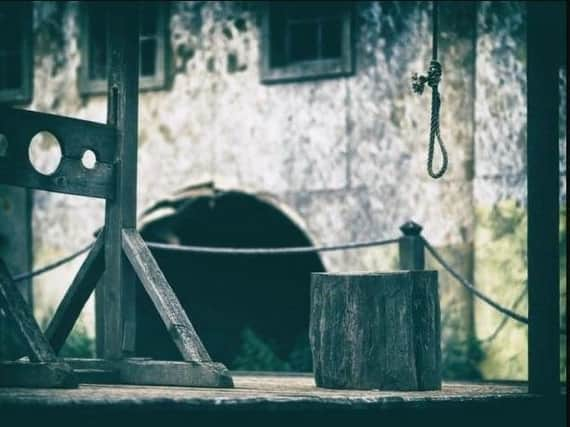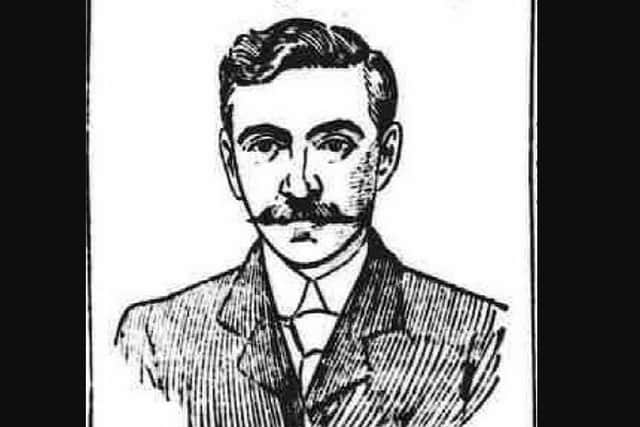Evil 'Blackpool Ripper' executed on this day 117 years ago for horrific murder of young mum


What had caused poor Mary Hannah Starr to deserve such a gruesome fate some 117 years ago? Simply, she had defied the will of a violent and controlling husband.
On a chilly December 29, 1903, Henry Bertram Starr, the Blackpool Ripper, climbed the scaffold at Walton Prison in Liverpool to be executed for his terrible crime.
Advertisement
Hide AdAdvertisement
Hide AdThe 31-year-old had murdered his wife, Mary, at her mother's Lord Street home on November 24.


But were it not for a tragic miscarriage of justice years before, poor Mary could have avoided such a fate.
AN ABUSIVE MARRIAGE
Henry and Mary, 27, married hastily in March 1903 after it emerged that Mary was three months pregnant with his child.
The relationship quickly broke down. As a labourer, Henry brought in a meagre wage which he squandered on alcohol to feed his long-term addiction. The couple quarrelled and, spurred on by the drink, Henry's abuse of his bride turned physical. Eventually, he left Lord Street and shacked up with a friend on Hardman Street.
Advertisement
Hide AdAdvertisement
Hide AdThe pair tried to patch up their fractured relationship following the birth of their child in August. But Henry soon fell back into old habits, and it was poor Mary who bore the bruises.
So severe was Henry's abuse that Mary, to protect herself and her baby, was willing to buck the traditions of polite society that would condemn her as a 'fallen woman' and a failed wife. She left her brutish husband and moved back in with her mother on Lord Street.
Devastated, Henry begged Mary to take him back, but she refused. Years of ill treatment had become too much for her. On November 23 she obtained a separation order against him, and a maintenance order for six shillings a week. The granting of such an order was uncommon and speaks to the extent of Henry's violent temper which would end her life.
On November 24, a drunk and enraged Henry crept into Mary's mother's house through an unlocked back door. Following Mary into the kitchen, he seized a bread knife and plunged it repeatedly into the young mother's chest and neck in a frenzied assault that left her with broken bones and 20 gaping, fatal wounds. When the blade broke off in the middle, Henry grabbed another knife and carried on.
Advertisement
Hide AdAdvertisement
Hide AdMary's mother rushed to her daughter's aid and was injured, but survived and was able to raise the alarm after Henry had fled. He was found by police in the Talbot Square area an hour later, soaked in blood.
Starr was tried in Liverpool on December 7, 1903. His only defence was that his mind had been impaired by alcohol. But this did not wash with the jury, who did not even had to retire for debate before finding him guilty of murder.
He was hanged on December 28. An open letter he wrote warning men against following the path of evil was widely published after his death.
DID A CHILD KILLER WALK FREE?
Could Mary's death have been avoided if not for a terrible miscarriage of justice?
Advertisement
Hide AdAdvertisement
Hide AdYears before brutally slaughtering his wife, Starr was accused of the murder of a 16-year-old girl, Eleanor Coulthard, in March, 1896.
Starr was working as a travelling salesman for a Clitheroe firm at the time, and met young Eleanor - who was a servant - in nearby Chatburn.
Infatuated, Eleanor penned letters declaring her love for Henry, and it was rumored that the two were an item. When she was found drowned in the River Ribble, suspicion immediately fell on him.
A policeman said that he had seen Henry the night Eleanor was killed, drunk and soaked to the bone with water.
Advertisement
Hide AdAdvertisement
Hide AdBut Henry claimed he had merely fallen into the Ribble in a drunken haze.
With no solid evidence against him, the man who would become known as 'The Blackpool Ripper' walked away scot free - to kill again.
THOUSANDS MOURNED INNOCENT WOMAN
Mary was buried in Layton Cemetery on November 29. Thousands of people lined the streets to pay their respects.
The mother-of-one had been born in Oldham to a machine fitter father and a housewife mother. Before moving to Blackpool and marrying Henry, she worked as a domestic servant.
THE BLACKPOOL RIPPER
Advertisement
Hide AdAdvertisement
Hide AdHenry Bertram Starr was born in Cumbria circa 1872. As a child he lived in Workington with his aunt and uncle, Eleanor and John Waller, and his grandmother Jane McLorry. In a 1891 national census, taken when Henry was 19, he was still living at home and had been joined by a Roger Starr, 17, who may have been his brother.
The boys lived a comfortable upbringing, provided for by their uncle, a plasterer, and aunt, a baker. At a time when working class children as young as nine were often thrust into the most gruelling jobs, neither Henry nor Roger had to work.